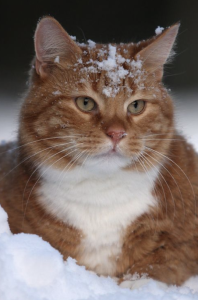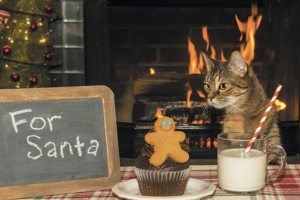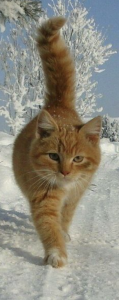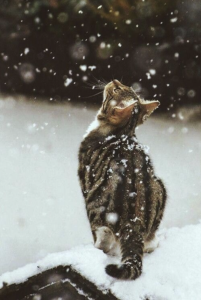Winter 2022 Newsletter

Hello and welcome to our winter newsletter.
The weather has certainly changed now, and the warm summer months are far behind us. Despite the fact that most healthy cats have a good fur coat, I am sure that most of them dislike the cold as much as we do. That is why we need to make sure that our cats, both indoor and especially outdoor, have somewhere warm to sleep. Getting them in for the night earlier will not only protect them from the cold but also reduce the chance of them fighting and getting injured. Please remember that if you are supplying drinking water outdoors to make sure that it is kept clear of ice.
Even though the 5th of November is past we all know that fireworks will continue to be used well into the new year so I hope you will forgive me if I reiterate some of my advice from our last newsletter.
We not only need to make sure our cats are indoors earlier and with a quiet small space to hide in, but for those cats which are nervous of the noises and flashes it may be worth thinking of using stress relieving devices such as Feliway or equivalents. There are also other products such as Pet Remedy and homoeopathic treatments available which may help. Keeping the curtains closed and playing music or the television may help and there are noise desensitisation CDs available – but all the above take time and really need to be started earlier in the year. What can be an exciting and enjoyable evening for us, can be a terrifying experience to cats.
It is also a sad fact that while in practice I often had cats brought to the surgery with injuries from fireworks. These were mostly caused by irresponsible and cruel youngsters (and some old enough to know better) tying fireworks to cats – but accidents at home can also happen, so please keep cats away from any home fireworks displays.
As I briefly mentioned in our autumn newsletter, another danger to our cats in winter is antifreeze used in car radiators. Recently I discovered that the fluid used in heating systems in motorhomes is also antifreeze. With more motorhomes and campervans on the road this has become even more important. When we had our fluid changed in ours recently the engineer doing it was not aware of this danger to cats. He is now giving out advice leaflets when he does this service. If you have any garages or DIY car mechanics about, antifreeze is very attractive to cats and is also extremely toxic. It causes irreparable damage to the kidneys so please make sure that any stored antifreeze is securely locked away from your cat; and don’t forget that in winter antifreeze is also added to windshield wiper fluid and other de-icers too.
Winter obviously means Christmas but try and look at it from a cat’s point of view. There is an information sheet on our website that is well worth looking at: www.feline-friends.org.uk/your-cats-christmas

Something I did not mention in that Christmas article is Silica gel sachets. I am often asked if these are toxic to cats because they are usually marked ‘do not eat’. Silica gel in itself is not toxic, although if it is eaten it can cause irritation with vomiting or diarrhoea. The biggest danger is if the sachets are eaten whole – when it could cause a physical obstruction in the gut. Therefore, as with any small item, it is best to be careful and dispose of them responsibly.
Winter is the time when our roads can become dangerous with ice and snow and, quite rightly, our Councils will be spreading grit and rock salt on them. That is fine for us wearing shoes, but cat’s paws can become very sore either directly from the rock salt or by the cat licking to try and remove any grit trapped between its toes. It is a good idea to check your cat’s paws when they come in and even wash them depending on your cat’s temperament!

Despite the enormous rises in energy bills many of us will have to turn on our central heating at some stage. From a flea’s point of view, if there are any eggs lurking in the house this will feel like spring, and it is possible to get a surge in the flea population. So please keep your preventative flea control going.
If the temperature outside drops below zero degrees C your cat may be at risk of frostbite and even hypothermia if they spend long periods outside. So make sure that they enter the winter in as good a physical condition as possible.
Your cat’s skin can become dry in the winter, just like ours. Dry skin can appear red, scaly and flaky. If it’s very itchy your cat may lick, scratch or bite at it – causing sores and scabbing. Check your cat’s skin even more regularly during the winter, and if you spot any problems visit your vet for treatment. Don’t be tempted to try creams used for us humans – they might be poisonous to cats! You might also ask your vet if Omega 3 fatty acids would be beneficial for your feline companion/s.
Please keep your cat’s microchip details up to date in case he/she decides to seek warmth away from your home.
You really do need to keep an even closer eye on the weight of your cat/s during the long winter months. If they are getting less activity and more treats it is all too easy to pile on the extra pounds – which will lead to health problems later on. So any games that will encourage physical activity are good news for the ongoing health of your cat.
Older cats are more affected by the cold. Low temperature can be very painful for pets with arthritis. Be sure to give them warm spaces to curl up in, with food and fresh water (and litter trays) easily to hand.
Finally, it may be obvious, but ensure that snow does not pile up near the cat flap, and that the flap itself does not freeze closed.

That’s all for now, but please remember to check in again for our spring newsletter next year – and have a very happy Christmas!

Eric McCarrison BVMS MRCVS

 menu
menu